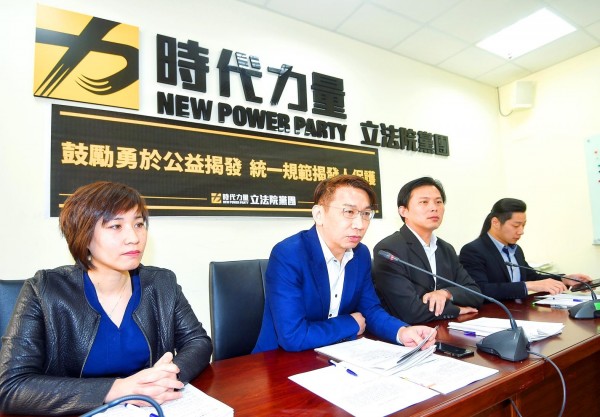《TAIPEI TIMES 焦點》 NPP pushes for return of Lien assets

From left, the New Power Party’s Kawlo Iyun Pacidal, Hsu Yung-ming, Huang Kuo-chang and Freddy Lim attend a news conference at the party’s legislative caucus office in Taipei yesterday. Photo: Fang Pin-chao, Taipei Times
WHISTLE-BLOWER RULES: Party legislators presented a draft bill aimed at making it easier to report malpractice by bolstering rules against disclosure of personal data
By Sean Lin / Staff reporter
The New Power Party (NPP) yesterday said it would seek to have former vice president Lien Chan’s (連戰) family turn in assets that his father, Lien Chen-tung (連震東), allegedly took from the government after Japan renounced its control over Taiwan after World War II.
The NPP in this legislative session is to submit a change to the transitional justice bill it proposed last year, which would remove draft provisions targeting assets illegally obtained by political parties, NPP Legislator Freddy Lim (林昶佐) told a news conference in Taipei.
The Ill-gotten Party Assets Settlement Committee is already probing the assets, while the new provisions would mandate that former civil servants or other people return improperly obtained assets the Japanese colonial era administration left with the government, Lim said.
The most notable of these is the Taipei Jen Chi Hospital, a philanthropic facility formerly run by the Japanese colonial government.
The hospital was established by the Japanese government, which merged private medical facilities dating back to the Qing Dynasty with premises near Taipei Railway Station and Ximending (西門町) area in Taipei.
Lien Chen-tung, a former Chinese Nationalist Party (KMT) government official who managed the handover of Taipei from Japan, took over the facility and in 1945 converted it into a private foundation.
In 1971, he became the president of the hospital’s board of directors.
Lien Chan’s wife, Lien Fang Yu (連方瑀), became a hospital director in 2003.
Land registered as belonging the hospital, of which the Lien family reportedly owns a large portion, is estimated to be worth about NT$200 billion (US$6.6 billion), reports show.
Revisions to the bill are to be discussed at a legislative meeting on Friday, NPP caucus convener Hsu Yung-ming (徐永明) said.
Also yesterday, NPP legislators unveiled a draft bill aimed at protecting whistle-blowers who report malpractice by government agencies, state-run enterprises or private firms to police or investigators.
Regulations on protecting whistle-blowers are diffuse, as they are found in a number of acts, but the level of protection they offer are inconsistent, putting those who might report wrongdoing in a risky position, NPP Executive Chairman Huang Kuo-chang (黃國昌) said.
Therefore, people with information on potential illegalities are often reluctant to come forward for fear of retaliation, which is why the rules have been ineffective in preventing malpractice, Huang said.
The draft prohibits officials in charge of compiling reports on disclosures by public servants from registering their names, birthdates, addresses, IDs or passport numbers.
Whistle-blowers in the public sector should not be required to sign their names when making a statement, but should be assigned codes and be fingerprinted instead, the draft says.
Authorities should make copies of written records or other documents containing information that might reveal a whistle-blower’s identity and store them in special archives that could not be viewed or provided to investigative branches, it says.
Officials who leak the identity of a whistle-blower, jeopardizing their safety or property, would face criminal charges and could be required to pay compensation up to three times the losses a whistle-blower sustains as a result of a leak, it says.
Hsu said that the rewards for reporting illicit activity are nominal and the draft aims to boost such incentives.
Authorities must not issue a reward of less than 10 percent of a fine levied on a wrongdoer, the draft says.
The bill would cover people who report breaches of environmental protection, food safety, labor rights and occupational safety regulations.
新聞來源:TAIPEI TIMES
















